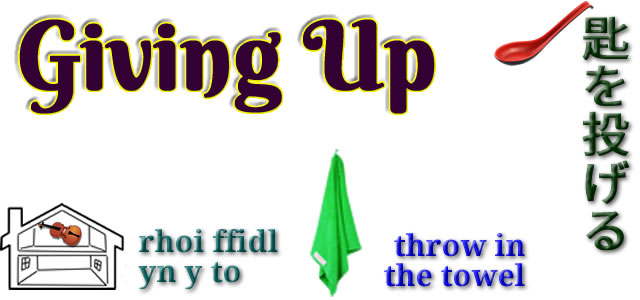I have some news – I’ve had enough of learning languages and am giving up, throwing in the towel, putting the fiddle in the roof, throwing a spoon, and throwing the axe in the lake.

This is something I’ve been thinking about for a while. I like speaking other languages, at least sometimes, but the process of learning them can be a bit tedious. I already speak some languages reasonably well and don’t currently need to learn any more, so maybe my time would be better spent doing other things.
My other main passion is music – I like to sing, to play instruments, and to write songs and tunes. I’ll be spending more time doing this, and will maybe even focus on one instrument, at least for a while, and learn to play it better.
The question is, which instrument? I have a house full of them, including a piano, harps, guitars, ukuleles, recorders, whistles, ocarinas, harmonicas, melodicas, a mandolin, a bodhrán and a cavaquinho.
The instrument I play most often at the moment is the mandolin, so maybe I should focus on that.
If you’ve noticed the date, you may realise that this post is in fact an April Fool. I’m not giving up on learning languages, and actually do enjoy the process, most of the time, and while I do want to improve my mandolin playing, I also want to improve my playing of other instruments.
Incidentally, let’s look at some ways to say that you’re giving up.
In English you might say you quit, you’re calling it a day, you’re calling it quits you’re throwing in the towel or the sponge or the cards, or you’re throwing up your hands.
Equivalent phrases in other languages include:
- hodit flintu do žita = to throw a flint into the rye (Czech)
- jeter le manche après la cognée = to throw the handle after the axe (French)
- leggja árar í bát = to put oars in a boat (Icelandic)
- do hata a chaitheamh leis = to throw your hat in (Irish)
- gettare le armi = to throw away your weapons (Italian)
- 匙を投げる (saji o nageru) = to throw a spoon (Japanese)
- подня́ть бе́лый флаг (podnjat’ belyj flag) = to raise the white flag (Russian)
- leig an saoghal leis an t-sruth = to let the world flow (Scottish Gaelic)
- baciti pušku u šaš = to throw a gun into the sedge (Serbian)
- kasta yxan i sjön = to throw the axe into the lake (Swedish)
- rhoi’r ffidl yn y to = to put the fiddle in the roof (Welsh)
More details of these phrases can be found on Wiktionary.
Do you have any others?

In German: “das Handtuch werfen” – to throw the towel (in). I think this expression comes from boxing.
Simon, I would hate for you to quit, give up, or throw anything, anywhere. I gain quite a bit of satisfaction from your language reviews, and after years of trying to help you with them, I am almost good at it. And, you wouldn’t want ME to quit, would you?
You had me worried for quite a while there!
There is another German expression, nearly identical to the Czech one:
“Die Flinte ins Korn werfen” = to throw the flint/shotgun into the field (of grains)
I cannot say that “kasta yxan i sjön” is entirely equivalent to quitting doing something.
Sometimes it is more of throwing away something (as the literal meaning is),
or trying to do something impossible.
Like Robert, I was a bit scared, until I read the whole article and realized the date.
Omniglot is very important for me, as you probably know
(even if , for some reason, cannot make direct (e-mail) contact with you anymore,
which is very sad for me).
I like music, as well, like you, but I have no sense of rhythm,
and cannot play any instrument.
I do not know what kind of instrument a bodhrán or a cavaquinho is
(though I can guess where they come from, Ireland and Portugal, respective).
Mattias, you could try emailing me at simon_ager[at]hotmail[dot]com or omniglot[at]gmail[dot]com.
A bodhrán is a kind of Irish drum, and a cavaquinho is a four-stringed Portuguese instrument the same size as a ukulele, but with steel strings and different tuning.
Simon, we need you! Please don’t throw in the fiddle, wrappped up in a towel with a flint, into the rye on a boat with a hat!
In Polish:
“Odpuścić sobie (coś)”: from puścić = to let go (of something), “od-” adds a feeling of distance and “sobie” = reflexive pronoun
“Dać sobie spokój (z czymś)”: give oneself peace with something
Some decades ago I used to hear “dać sobie siana”: give oneself hay (no idea where that came from!). But I’m not sure it’s used any more.
This post had me worried for a moment! It’s always disheartening to hear about someone giving up on their passions, especially when they’re as enriching as learning languages or playing music. But you got me – an April Fool’s joke indeed!